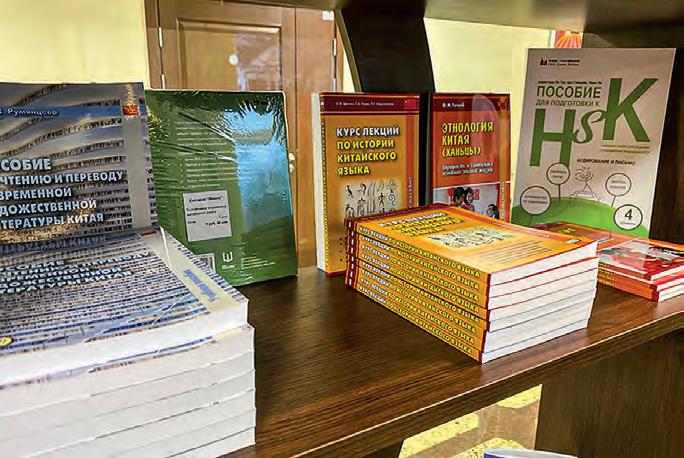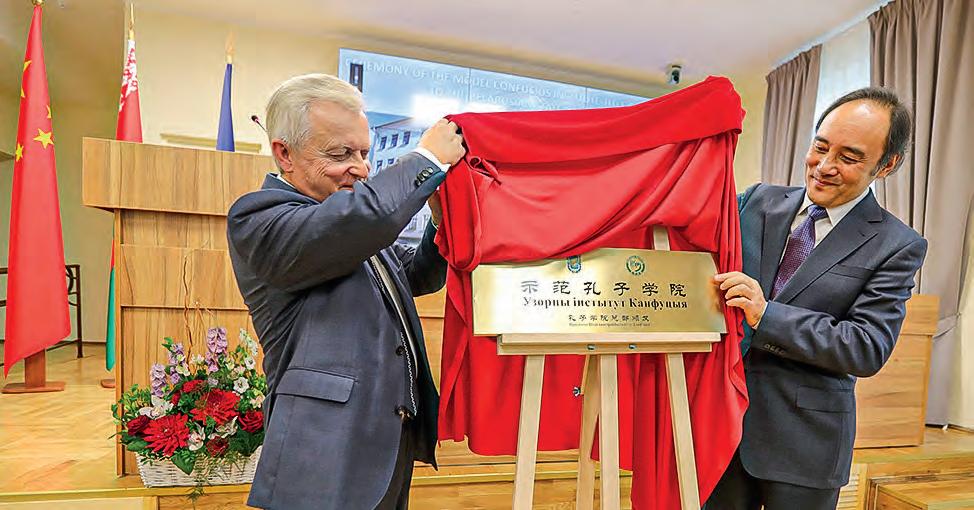
10 minute read
between Minsk and Beijing remains unchanged. China is a strategic partner of Belarus
TO THE BENEFIT OF BOTH COUNTRIES
Journalist Inessa Pleskachevskaya met with Anatoly Tozik, the Chairman of the Belarus-China Friendship Society, Director of the Republican Confucius Institute of Sinology at BSU, former ambassador of Belarus to China.
Advertisement
Today, a four-storey building in the very center of Minsk, on 11 Revolyutsionnaya Street, is difficult to recognize: a couple of years ago, people quickly ran past this half-abandoned building, and now it is a renovated light house with large windows and a unique library. Unique because it was donated by the press office of the State Council of the People’s Republic of China, and this is the most interesting library on China in our country. In the building there are a lot more unique things related to China. No wonder as the Republican Confucius Institute of Sinology at BSU (RCIS) is located there. I came there to talk with its director Anatoly Afanasyevich Tozik, whom I have known since his work as the Ambassador of the Republic of Belarus to China. Interest in China also unites us today.
Everyone has their own personal history of the appearance of this country in life. Anatoly Afanasyevich recalls that China “burst into his life” at the end of 2004, “when I was appointed co-chairman of the Intergovernmental Commission on Trade and Economic Cooperation. But it first appeared in the 1960s, when I was studying at the history department. Then the Soviet-Chinese relations were uneasy, i.e. the events on Damansky (island. - Auth.), 1969, we were greatly concerned about it. Fortunately, my teachers formed a very correct attitude towards this people, their cul-
ZVIAZDA.BY
Anatoly Tozik
ture. I don’t know why, but all my life I had the idea that I should work in China, that I would be there. At first it seemed to be a dream, but, probably, when you really want something...”
Anatoly Tozik was unable to part with China after his return to Belarus: he was in charge of bilateral cooperation in the rank of Deputy Prime Minister. It is admitted that when he left the civil service in December 2014, he planned to “start paying off his debts to the family, a lot of things had accumulated over the decades” and “felt very well” as a professor at the Department of Diplomatic and Consular Service. But then the Headquarters of Confucius Institutes in Beijing and his native BSU made an offer, which he could not refuse: to head Confucius Institute in Minsk. In September 2019, the institute became a model one. — When it was announced that we had been awarded this title, the Deputy Director General of the Headquarters of Confucius Institutes said that at the moment the Republican Confucius Institute of Sinology at BSU was perhaps the best among all such institutions, and there are more than five hundred of them in the world now. This is a recognition of our level, quality of education and work.
Anatoly Tozik is happy to speak about what has already been achieved, but even more enthusiastic about what should be done.
One of the new directions of work initiated by the institute is training of Chinese
language school teachers. Anatoly Tozik is sure that there is a devastating lack of Chinese teachers in our country: “Unfortunately, the situation is such that less than one percent of pupils study this language at school. This is a very serious problem, and the lag in this area is starting to restrain the entire range of bilateral cooperation.” Sinologists are trained at the Faculty of Philology of the Belarusian State University and at Minsk Linguistic University, only about twenty people annually are financed from the budget. Since the training is good, “the Chinese and Belarusian-Chinese organizations working in our country, and there are about seventy of them in China-Belarus industrial park, are delighted to employ these graduates. Chinese is taught only in 30 schools. When I worked as the Deputy Prime Minister and suggested paying attention to this, the Ministry of Education answered that “there are no applicants.” And when I came here, almost every month we received calls from schools, even from the rural ones: “Help us to find a teacher.” That is, the situation has changed, people are beginning to understand that today knowledge of the Chinese language is an additional guarantee that a person will find an interesting job with a good salary. Therefore, today demand starts to outrun supply.” And here, in RCIS, we figured out how to meet it: to train Chinese teachers from among those who already work at school and teach other foreign languages. The experiment, i.e. two years of budget-financed study, began in 2018, and the first graduation took place last year. The Ministry of Education finances this training.
— Are your students from all over the country?
— Yes, we try to admit them from every region. Classes are conducted by the most qualified Belarusian teachers of the Chinese language. And the Chinese side sent several teachers with academic degrees and titles specially for this project. We have set up a chair of the Chinese language; I think that today it is the best in the republic. The format of training: two months of deep immersion in the subject at the institute, ten academic hours daily, and two months on-line, new knowledge every day. In the morning there is a task, in the evening there is feedback.
— At an intensive rate!
— In 2018, we took on a small group of 16 people. Thirteen have succeeded, a good figure (smiles). Two people left due to illness, and we expelled one for missing classes without a good reason. He was expelled in the first week, and for two years I felt calm. Now the second and third admissions of students are being trained, 60 people. They are so bustling, very interested. I teach them a course on cross-cultural studies; I really like the audience. They, unlike students, have a different motivation. Students are not sure whether they need it or not, because Oriental studies is a narrow specialty. But adults understand that they need it. With such students, I, as a teacher, experience maximum professional satisfaction, I understand my relevance. Therefore, I decided to teach a course on Chinese history as well: I do not want to part with them.
— The idea of motivation is very inter‑ esting...
— They understand that one language is one leg, and another language, on top of that Chinese, is the other, and they will firmly stand on the ground. I think this is very important for teachers of languages such as Spanish, French, German. The desire of children to learn these languages is diminishing, so teachers find themselves in a difficult situation. One of our graduates, having received her diploma, said: “Thank you very much. I used to teach German at school, but parents don’t want their children to learn it. And I was thinking of working in a kindergarten as a teacher, but now I have been invited to work in a gymnasium.” One of our graduates was invited to teach at Polesie State University, another one — at the Republican Institute for Knowledge Control. Everyone — this was my principled stand — had to pass the HSK international qualification exam, with 4-5 level. With level 4, one can be accepted to many Chinese universities, and with level 5, one can enter any Chinese university without prior specific training. So, this project is successful. Besides, our graduates confirm: the level of training that we give is not lower than at the philological department of the
ZVIAZDA.BY


Belarusian State University or at the Minsk State Linguistic University. Our institute will continue the work in this direction.
— Has the coronavirus pandemic forced the institute to seek new forms of education?
— We decided to try distance teaching — so that people can learn the language without getting a diploma. Chinese teachers were more prepared for distance learning. Our teachers followed them, we have a very friendly team. After all, we can give people who know Russian the opportunity to study Chinese wherever they are, even in Australia.
— That is, you go big…
— We go big, really (smiles). Another direction that we have been engaged in for a long time is the study of China, primarily the experience of the policy of reforms and openness, in view of the possibility of implementation of this experience in our country. It is very important for us now to form the National School of Sinology. China today is rapidly moving towards the status of number one country on the planet, and a lot will depend on it in the future. Perhaps it will play a decisive role in whether humanity will emerge from a deep systemic crisis or not. But for us its economic, technological and investment potential is important. But this country should be known, and be known not at the level of expression of friendship, it should be studied and studied deeply. This is a different civilization, a system of values, if you will, a different system of interpersonal, corporate communication. It is necessary to know the state of individual industries, their capabilities, the level of technology, so that one can actively use all this in the interests of own country — of course, on the principle of mutual benefit, mutual interest. I think the latter is a big strategic challenge. There is no such school in the country yet.
Another new direction of the Institute’s work is information and analytical support of practical bilateral cooperation. Tuesday was announced as a consultation day, consultations are provided free of charge, the main goal, according to Anatoly Tozik, is “to see what people want and what we can do. There is interest, but very little so far. Either people do not know about us, or because of the pandemic, everything has slowed down. This worries me very much, because the pandemic will end, and our relations with China are strategic, and I want us not to roll back in the volume, dynamics and structure of these relations during this time.”
We walk about the institute building — wide corridors, cozy classrooms equipped with the latest technology, and Anatoly Afanasyevich does not hide his pride: here one can hold international conferences of citizens with Belarus — with the Belarusian language, culture, with the country in general. A textbook of the Belarusian language for Chinese students made at the Institute is about to be published by the publishing center of the Belarusian State University.
Today in China — and this information, I am sure, will surprise many - there are centers for the study of Belarus, the Belarusian language and culture in 14 universities. The Belarusian language is studied in Beijing,

BELTA
Grand opening of the new RCIS building. Pictured: Anatoly Tozik and Zhao Guocheng, Deputy Head of the Headquarters of Confucius Institutes.
the highest level: there are special booths for simultaneous translation, screens for video communication with the whole world. There is also a bookstore specializing in publications about China of the international publishing house “Chance”: a large selection of textbooks for learners of the Chinese language and many books on the tradition and culture of the large country. The store is open for everyone, not only for those who study at the institute. — In fact, at our request, Oriental Culture Publishing House was founded in Belarus. I try to attract everything related to China. We invited students of the Department of Philology, majoring in Chinese, so that they could feel the vibes. There is one more direction that I consider very important. This is the promotion of Belarus in China. It is my deep conviction that the task of Confucius institutes and, above all, our institute is not only to acquaint Belarusian citizens with China, but also to acquaint Chinese Shanghai, Tianjin, Xian and other cities. Moreover - “I’m going to use such high-flown style now,” Anatoly Afanasyevich smiles: — A large educational Chinese-Belarusian and Belarusian-Chinese dictionary, prepared by our institute in cooperation with the Institute of Linguistics of the National Academy of Sciences of Belarus, is coming out soon. In our bilateral cooperation, this is actually a big event. I think it is very important. We are a sovereign state, yes, we have two official languages, but Belarusian is the first in the Constitution, this is the language of the titular nation. But until now we haven’t had such a dictionary.
When I, amazed by the variety of directions of work, bid farewell to Anatoly Tozik, he said: “I work to the benefit of my country and to the benefit of China too, but only in those directions, problems, topics that correspond to the interests of both countries.”
Inessa Pleskachevskaya



